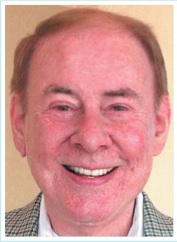In the summertime I liked to go over to Granny Lue’s and Poo’s and just “hang out.” This was a very long time before that term came into vogue, but its meaning is ageless. We did practically nothing and enjoyed it. The main attraction was sitting on the front porch and watching the people go by. If someone looked amiable and willing to chat, Poo would say, “How do?”
And then the person would say, “How do?”
I thought this was hilarious, but I didn’t let on. Of course, it’s just a contraction of “How do you do?” which is also pretty goofy, especially with a different emphasis on a different word, like, “How DO you do?”
Poo had a gift for seeing ordinary things and pointing out that they were really pretty interesting. He taught me how to watch people and notice the way they would swing their arms while walking. Some were really vigorous swingers while others would hardly swing their arms at all. We watched the people and talked about the various ways they were swinging their arms. I remember itas pretty much fun.
Oh, I should tell you that I was born on Mother’s Day, 1938. The man who came to be called “Poo,” decided that he wanted to be called, “Paw.” I guess hewas trying to distance himself from the Grandparent label. Anyhow, when I was just getting the hang of talking, “Paw” always came out as “Poo.” It stuck. Everybody started calling him “Poo.” Such is the power of a grandchild. Poo came from quite a different generation. He was born in 1890. And there were some things that he found innocent and amusing that I didn’t find that way at all.
He taught me this jingle:
I went down to the river
And I couldn;t get across
So I jumped on a n—r
“Cause I thought he was a horse.
The horse wouldn’t run
So I traded it for a gun.
The gun wouldn’t shoot
So I traded it for a boot.
The boot wouldn’t wear
So I traded it for a bear.
The bear wouldn’t dance
So I kicked it in the pants.
I thought about reminding Poo of the song I sang in Sunday School.
Black or yellow red or white, they are precious in his sight…..but I didn’t. I thought it would make him think that I was pretty persnickety. When I think back on those front porch days, I remember the song from South Pacific, “They Have To Be Carefully Taught.” I wish Poo could have listened to it with me. Then maybe we could have talked about what it meant and turned it this way and that, And then, when we both felt pretty good about it, we could have gone back to watching the people swing their arms as they came our way to say, “How Do?”

